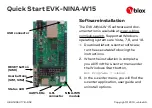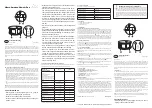
Installing the Multi-function Control Card (MCC) into an Xtralis VESDA VLF detector
Installation de la carte de contrôle multifonction (MCC) dans un détecteur Xtralis VESDA VLF
Installation der Multifunktions Kontroll-Karte (Relaiskarte) (MCC) im Xtralis VESDA VLF Detektor
Instalación de la Tarjeta de control multifunción (MCC) en un detector Xtralis VESDA VLF
在
Xtralis VESDA VLF
探测器上安装多功能控制卡
(MCC)
Installazione della Scheda di controllo multifunzione (MCC) in un rilevatore Xtralis VESDA VLF
Press the security tab on the side of the VLF with a flat blade screw driver and lift the field service access door.
Appuyez sur la languette de sécurité sur le côté du VLF à l’aide d’un tournevis plat et soulevez la trappe d’accès de service sur site.
Drücken Sie den Sicherheitsstift an der Seite des VLF mit einem flachen Schraubendreher herunter und heben öffnen Sie die Wartungstür.
Presione la pestaña de seguridad que hay en el lateral de la unidad VLF con un destornillador de punta plana y levante la puerta de acceso para
mantenimiento.
用一字螺丝刀按下
VLF
探测器侧面的保险舌,抬起现场检修门。
Premere la linguetta di sicurezza posta sul lato del VLF con un cacciavite a lama piatta e sollevare lo sportello di accesso per la manutenzione in loco.
Attention:
Xtralis VESDA VLF-250 units manufactured prior to March 2005 must be upgraded to be compatible with the
Multi-function Control Card
. Please refer to the Technical Tip on
www.xtralis.com or your local Xtralis office or VESDA distributor for more information.
Attention :
Pour les détecteurs Xtralis VESDA VLF-250 fabriqués avant Mars 2005, il faut effectuer une mise à jour logicielle pour les rendre compatibles avec la
carte de contrôle multifonction
.
Se référer à la section technique du site www.xtralis.com ou contacter le bureau Xtralis le plus proche ou votre interlocuteur VESDA pour plus d’information.
Achtung:
Alle Xtralis VESDA VLF-250 Geräte, die vor März 2005 hergestellt wurden, müssen Softwaretechnisch aufgerüstet werden, damit sie mit der
Multifunktions-Relaiskarte
kompatibel
sind. Technischen Tipps erhalten Sie unter www.xtralis.com, bei Ihrem lokalen Büro von Xtralis oder Ihrem VESDA Händler.
Atención:
Las unidades Xtralis VESDA VLF-250 fabricadas antes de marzo de 2.005 deben actualizarse para ser compatibles con la
Tarjeta de control multifunción
. Consulte información
adicional en las indicaciones técnicas de www.xtralis.com, en su Delegación de Xtralis, o en su Distribuidor VESDA más próximo
注意:
在
2005
年
3
月前生产的
Xtralis VESDA VLF-250
探测器必须进行升级,使之与
MCC
多功能控制卡兼容。请参考
www.xtralis.com
网站上的技术提示,或咨询当地的
Xtralis
公司办事机构或代
理商,获取更多信息。
Attenzione:
Le unità Xtralis VESDA VLF-250 prodotte prima del marzo 2005 devono essere aggiornate per poter essere compatibili con la
Scheda di controllo multifunzione
. Per ulteriori
informazioni fare riferimento ai suggerimenti tecnici presenti sul sito www.xtralis.com oppure contattare l’ufficio locale della Xtralis oppure il distributore VESDA.
1
Remove the two retaining screws from the front cover of the VLF and lift and swing down the front cover.
Caution:
You must disconnect the power to the VLF before installing the MCC.
Déposez les deux vis de fixation du capot avant du VLF, soulevez et rabattez vers le bas le capot avant.
Attention :
Vous devez débrancher l’alimentation du VLF avant la pose de la carte MCC.
Lösen Sie die beiden Halterungsschrauben der Frontabdeckung des VLF, heben Sie die Frontabdeckung hoch und schwenken Sie sie nach unten.
Achtung:
Bevor Sie die MCC Karte installieren, müssen Sie den VLF vom Stromnetz trennen.
Tras retirar los dos tornillos de sujeción de la cubierta frontal de la unidad VLF, levante la cubierta y gírela hacia abajo.
Aviso:
antes de instalar la tarjeta MCC debe desconectar la alimentación de la unidad VLF.
拧开
VLF
探测器前面板上的
2
个固定螺丝,抬起并向下旋转打开前面板。
注意:在安装
MCC
多功能控制卡前必须将
VLF
探测器的电源断开。
Rimuovere le due viti di fissaggio dalla parte anteriore del VLF sollevando e ruotando quindi verso il basso la copertura frontale.
Nota:
È necessario scollegare l’alimentazione del VLF prima di installare la MCC.
2
Plug one end of the interface cable into the MCC and the other end into the interface cable socket inside the VLF.
Branchez une extrémité du câble d’interface dans la carte MCC et l’autre extrémité sur le socle pour câble d’interface du VLF.
Verbinden Sie das Flachbandkabel mit der MCC Karte und dem Steckplatz im VLF.
Conecte un extremo del cable de interfaz en la MCC y el otro extremo en el enchufe para el cable de interfaz que hay dentro de la unidad VLF.
将连接线的一端插入
MCC
多功能控制卡,将连接线的另一端插入
VLF
探测器内的连接线插槽。
Inserire un’estremità del cavo di interfaccia nell’MCC e l’altra nella connettore del cavo di interfaccia all’interno del VLF.
3
VIC-030 model shown
VIC-020 and VIC-030 MCC
5
Field Wiring for the VIC-020 Model
Relay 1 and Relay 2:
Use two 3-pin connectors to connect Relay 1 and Relay 2. Relay 1 will report Alert and
Relay 2 will report Fire-2 on your Fire Alarm Control Panel (FACP) when the contact is closed (short circuit).
General Purpose Input (GPI):
Use the 2-pin
connector and the End of Line (EOL) resistor (2.7K ohms) to connect the GPI. If the GPI is active (contact closed), the detector will indicate Instant Fault Finder
Number 6. If the wire to the monitoring device is broken (open circuit), the detector will indicate Instant Fault Finder Number 8.
Câblage sur site du modèle VIC-020
Relais 1 et Relais 2 :
Utilisez deux connecteurs 3 broches pour relier Relais 1 et Relais 2. Relais 1 signale les alertes et Relais 2 signale Incendie-2 à votre
panneau de contrôle d’alarme incendie (FACP) quand le contact est fermé (court-circuit).
Entrée d’usage général (GPI) :
Utilisez le connecteur 2 broches et le
résistor de terminaison (EOL) (2,7 kohms) pour le branchement de l’entrée GPI. Si l’entrée GPI est active (contact fermé), le détecteur signale le défaut instané
numéro 6. Si le fil vers le dispositif de surveillance est rompu (circuit ouvert), le détecteur signale le défaut intantané numéro 8.
Verdrahtung des VIC-020 Modells
Relais 1 und Relais 2:
Nutzen Sie die 3 poligen Anschlußklemmen, um Relais 1 und Relais 2 anzuschließen. Wenn sich der Kontakt schließt (Schließer), löst
Relais 1 bei Anschaltung einer Brandmeldezentrale (BMA / BMZ) den Infoalarm aus und Relais 2 den Hauptalarm 2.
Allgemeiner Eingang (GPI):
Nutzen Sie
die 2 polige Anschlußklemme zum Anschluß des GPI, schließen Sie hier auch den mitgelieferten Leitungswiderstand (EOL) (2,7 K Ohm) an. Wenn der GPI
aktiv ist (Kontakt geschlossen), zeigt der Detektor die Instant Fault Finder Nummer 6 an. Wenn das Kabel zum Gerät defekt ist (offener Stromkreis), zeigt der
Detektor die Instant Fault Finder Nummer 8 an.
Cableado eléctrico del modelo VIC-020
Relay 1 (relé 1) y Relay 2 (relé 2):
use dos conectores de tres patillas para conectar los relés 1 y 2. El relé 1 notificará Alert (Alerta) y el relé 2 notificará Fire-2
(Incendio-2) en el Panel de control de alarmas de incendio (FACP, Fire Alarm Control Panel) cuando se cierre el contacto respectivo (cortocircuito).
Entrada
de propósito general (GPI, General Purpose Input):
use el conector de dos patillas y el resistor de terminación de línea (EOL) de 2,7 kohm para conectar la
GPI. Si la GPI está activada (contacto cerrado), el detector indicará Instant Fault Finder Number 6 (Localizador de fallos instantáneo Nº 6). Si se interrumpe el
cable de conexión con el dispositivo de control (circuito abierto), el detector indicará Instant Fault Finder Number 8 (Localizador de fallos instantáneo Nº 8).
VIC-020
的现场接线
1
号继电器和
2
号继电器:使用
2
个
3
针连接器连接
1
号继电器和
2
号继电器。当触点闭合(闭路),
1
号继电器向
FACP
火灾报警控制器报告“警告”报警信号,
2
号
继电器报告“火警
2
”报警信号。通用输入(
GPI
):使用
2
针连接器和末端电阻(
EOL
)(
2.7Kohms
)连接
GPI
通用输入。如果
GPI
通用输入在使用中(触点闭合),
探测器会指示“即时故障探测器
6
号故障”。如果连接监控设备的电缆断开(开路),则探测器会指示“即时故障探测器
8
号故障”。
Cablaggio del campo per il modello VIC-020
Relé 1 e relé 2:
Utilizzare due connettori a 3 pin per collegare il relé 1 e il relé 2. Quando il contatto si chiude (in corto) il relé 1 riporterà l’Azione mentre il relé
2 riporterà Fuoco-2 sul pannello di controllo antincendio (FACP).
Ingresso per scopi generici(GPI):
Per collegare la GPI utilizzare il connettore a 2 morsetti
sulla resistenza di fine linea (EOL) (da 2,7 kohm). Se la GPI è attiva (contatto chiuso), il rilevatore indicherà un evento istantaneo di guasto numero 6. Se il
cavo al dispositivo di monitoraggio è rotto (circuito aperto), il rilevatore indicherà evento istantaneo di guasto numero 8.
Relay 1 - Alert
Relay 2 - Fire-2
EOL
GPI - External Fault
VIC-020 Model
Fold the interface cable under the card and insert the card in the space provided. Align the hole in the card with the mount for the screw. Use the screw to
secure the card to the detector. You must secure the card to the detector to ground the card.
Rabattez le câble d’interface sous la carte et insérez la carte à l’emplacement prévu. Alignez le trou de la carte avec le support de la vis. Fixez la carte au
détecteur à l’aide de la vis. Vous devez fixer la carte au détecteur pour la mettre à la masse.
Falten Sie das Flachbandkabel unter der Karte zusammen und arretieren Sie die Karte in die dafür vorgesehenen Führung. Richten Sie die Schraubenöffnung
in der Karte entsprechend der Schraubenhalterung für die Schraube aus. Sichern Sie die Karte mit Hilfe der beigepackten Schraube am Detektor.
Achtung:
Die Karte muß mit der Schraube gesichert werden (Erdung)
Doble el cable de interfaz bajo la tarjeta e inserte la tarjeta en el espacio correspondiente. Alinee el orificio de la tarjeta con el soporte para el tornillo. Fije la
tarjeta al detector con el tornillo (debe fijar la tarjeta al detector para conectarla a tierra).
将连接线卷起置于多功能控制卡下面,并将多功能控制卡插入预留空间。将卡上的小孔与装配用螺丝孔对齐。用螺丝刀将多功能控制卡固定在探测器上。必须将
多功能控制卡固定在探测器上,使之接地。
Ripiegare il cavo di interfaccia sotto la scheda e inserire la scheda nello spazio previsto. Allineare il foro nella scheda con il montaggio per la vite. Utilizzare la
vite per bloccare la scheda al rilevatore. È necessario bloccare la scheda al rilevatore per effettuare la connessione di terra.
4
VIC-030 model shown
GPI+
GPI+
NO1
COM1
NO2
COM2




















